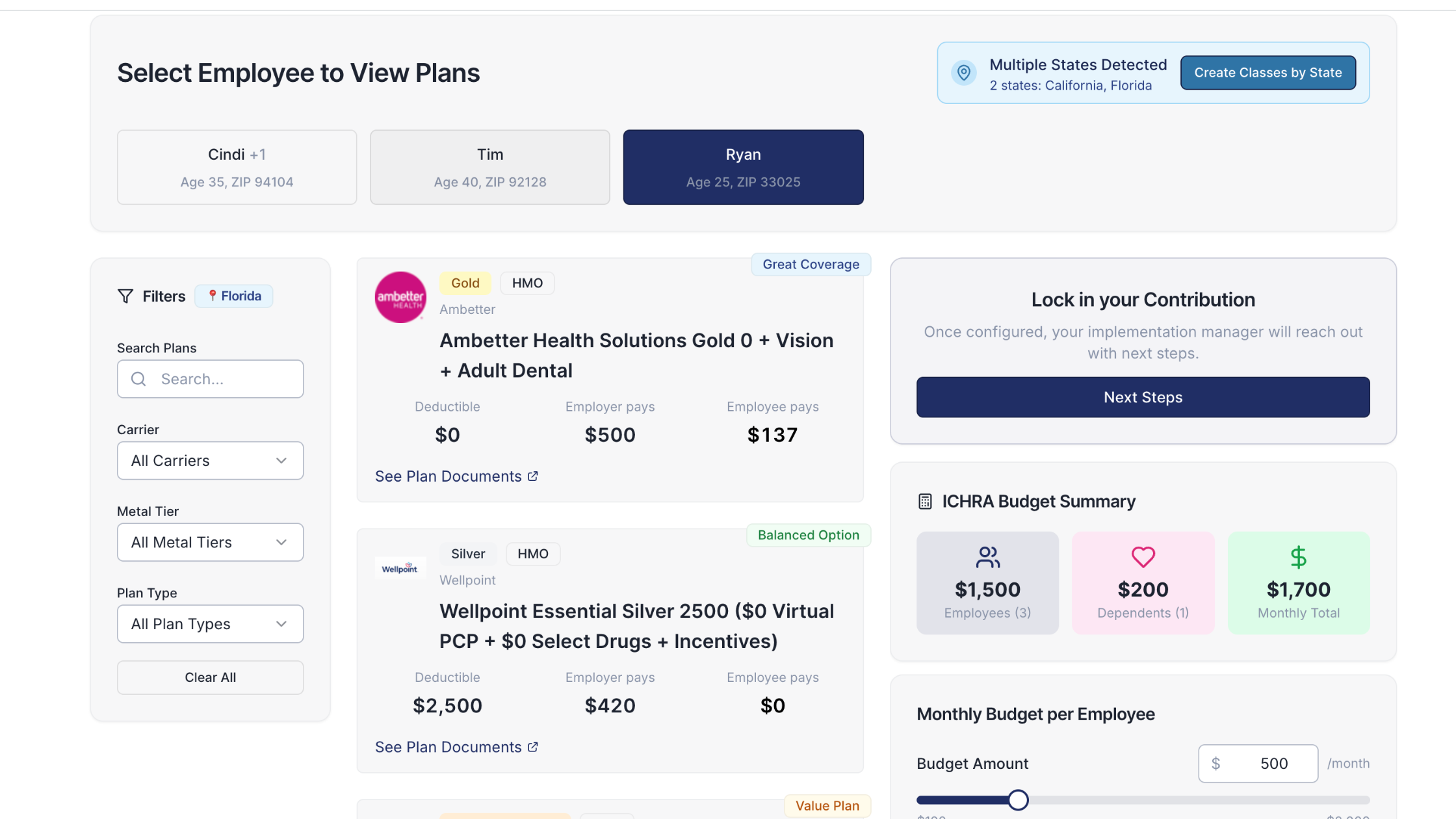The Health Insurance Marketplace - Explained

Most people have heard of "Obamacare" or "Healthcare.gov." These are nicknames for the Health Insurance Marketplace. In this guide, we’ll walk you through everything you need to know about Marketplace insurance, its benefits, and how to choose the right plan for you and your family.
Defining Health Insurance Marketplace Insurance
The Health Insurance Marketplace, established under the Affordable Care Act (ACA), is a platform where individuals and families can compare and purchase health insurance plans. This marketplace is designed to provide access to affordable healthcare coverage for those who do not receive insurance through their employer or government programs.
The Basics of the Health Insurance Marketplace
At its core, the Health Insurance Marketplace emphasizes choice and accessibility. It allows consumers to evaluate various insurance plans based on their expenses, coverage options, and provider networks. The marketplace is not just a shopping platform but also an essential tool for understanding one's health insurance options. By offering a user-friendly interface, the marketplace empowers individuals to make informed decisions about their healthcare needs, ensuring they find a plan that aligns with their financial and medical requirements.
The marketplace operates on an annual enrollment cycle from November 1 to December 15, meaning consumers have specific periods to enroll in or change their plans. This cyclical nature encourages individuals to reassess their healthcare needs regularly, especially as life circumstances change—such as starting a new job, moving to a different state, or experiencing significant health changes. The ability to compare plans side-by-side demystifies the often complex world of health insurance, making it more accessible to a broader audience.
Key Features of Marketplace Insurance
Marketplace insurance plans come with several key features that distinguish them from traditional insurance options:
- Standardization: All plans must cover a set of essential health benefits, ensuring consumers have access to necessary medical services.
- Financial Assistance: Depending on your income level, you may qualify for subsidies that reduce your premiums and out-of-pocket costs.
- Preventive Services: Many plans offer free preventive services, such as vaccinations and screenings, promoting early detection and healthy living.
Additionally, marketplace insurance plans offer flexibility through different coverage tiers. Consumers can choose from Bronze, Silver, Gold, and Platinum plans, each varying in cost-sharing structures and premium prices. This tiered system allows individuals to select a plan that best fits their healthcare usage and financial situation. For example, a Bronze plan may have lower monthly premiums but higher out-of-pocket costs, making it suitable for those who are generally healthy and do not anticipate frequent medical visits. Conversely, a Platinum plan, while more expensive upfront, offers lower out-of-pocket costs for those who require more regular medical attention.
The Importance of the Health Insurance Marketplace
The Health Insurance Marketplace plays a critical role in enhancing healthcare accessibility. By allowing individuals to compare options transparently, the marketplace empowers consumers to make informed choices about their health coverage. This system has revolutionized how people approach their healthcare needs, making it easier for millions to find suitable plans that cater to their unique circumstances.
Benefits of Choosing Marketplace Insurance
Choosing health insurance through the marketplace offers numerous benefits:
- Wide Variety of Plans: Consumers can tailor their choices to match specific needs, preferences, and budgets.
- Cost Transparency: The ability to compare plans side-by-side helps consumers identify the best financial fit.
- Consumer Protections: The ACA provides guidelines that protect against unfair practices, such as denial of coverage based on pre-existing conditions.
- Financial Assistance: The marketplace often offers subsidies and tax credits to eligible individuals, significantly lowering monthly premiums and out-of-pocket costs.
These benefits enable families to secure quality healthcare without the fear of crippling debt. Additionally, the marketplace is designed to be user-friendly, with resources and support available to help consumers navigate their options effectively, ensuring they find a plan that truly meets their needs.
How Marketplace Insurance Impacts Your Healthcare
Marketplace insurance directly impacts your healthcare by providing access to a network of doctors and hospitals. It helps reduce the financial burden of unexpected medical expenses, allowing individuals to seek necessary care without hesitation. Engaging with a marketplace plan offers not just insurance but peace of mind, especially in times of crisis, encouraging individuals to prioritize their health and well-being.
Furthermore, marketplace insurance often includes preventive services at no additional cost, such as vaccinations and annual check-ups. This proactive approach to healthcare can lead to early detection of potential health issues, resulting in better health outcomes. By fostering a culture of preventive care, the marketplace enhances individual health and contributes to the overall efficiency of the healthcare system, reducing long-term costs associated with untreated conditions.
How to Navigate the Health Insurance Marketplace
Navigating the marketplace can seem overwhelming, but with the right approach, it can be straightforward. Understanding how to enroll and key dates ensures you successfully acquire the right coverage.
Steps to Enroll in a Marketplace Plan
- Assess Your Needs: Determine your healthcare needs, budget, and preferred providers.
- Explore the Marketplace: Visit the official HealthCare.gov website to review available plans.
- Compare Plans: Analyze the coverage details, premiums, co-pays, and other costs associated with each plan.
- Fill Out Your Application: Provide your personal information and any required documentation.
- Select Your Plan: Choose the plan that best suits your needs and finalize your enrollment.
Understanding the Open Enrollment Period
The Open Enrollment Period is a crucial time when consumers can enroll in marketplace plans. It typically occurs once a year, and understanding its schedule is essential to avoid missing out. During this time, individuals can sign up for coverage, make changes to existing plans, or switch plans as needed. If you miss the Open Enrollment period, you may have to wait until the next year unless you qualify for a Special Enrollment Period due to qualifying life events, such as marriage or the birth of a child.
Types of Health Insurance Marketplace Plans
Marketplace plans come in several forms, each designed to cater to different healthcare needs and financial situations. Understanding these types can guide you toward the right choice.
Overview of Marketplace Insurance Plans
Marketplace insurance plans are categorized into five main types based on their coverage and cost-sharing structures:
- Bronze Plans: Lowest monthly premiums but higher out-of-pocket costs. Best for healthy individuals who don’t expect to use many medical services.
- Silver Plans: Moderate premiums and out-of-pocket costs, ideal for individuals who qualify for cost-sharing reductions.
- Gold Plans: Higher premiums with lower out-of-pocket costs, suitable for those who anticipate needing extensive medical care.
- Platinum Plans: Highest premiums and lowest out-of-pocket costs, providing the most comprehensive coverage.
- Catastrophic Plans: Low premiums for young, healthy individuals. They only kick in after a high deductible is met.
Comparing Different Marketplace Plans
When comparing marketplace plans, consider the following factors:
- Provider Networks: Check if your preferred doctors and healthcare facilities are in-network.
- Prescription Coverage: Ensure the plan covers your necessary medications and review associated costs.
- Total Costs: Analyze premiums, deductibles, co-pays, and out-of-pocket maximums to find the best financial fit.
Taking the time to compare these elements will lead to a more informed decision, ensuring your chosen plan aligns with your health and financial goals.
Understanding Costs and Savings in the Health Insurance Marketplace
Understanding the costs associated with marketplace insurance helps you manage your healthcare budget effectively. Knowing how premiums, deductibles, and out-of-pocket maximums work is crucial for making sound financial decisions about your health coverage.
Premiums, Deductibles, and Out-of-Pocket Maximums
Here’s a quick breakdown of key financial terms:
- Premium: The monthly payment you make to maintain your health insurance coverage.
- Deductible: The amount you pay out-of-pocket for healthcare services before your insurance kicks in.
- Out-of-Pocket Maximum: The most you’ll pay in a year for covered services, after which your insurance covers 100% of expenses.
Understanding these concepts allows you to plan for potential healthcare expenses and choose a plan that fits your financial situation.
How to Save Money on Marketplace Insurance
Here are several strategies to save money on marketplace insurance:
- Income Qualification: Ensure you report your income accurately; lower-income households may qualify for greater subsidies.
- Choose a Silver Plan: If you qualify for cost-sharing reductions, a Silver plan can significantly reduce your out-of-pocket expenses.
- Utilize Preventive Services: Take advantage of free preventive care to stay healthy and reduce reliance on more expensive medical care.
By being proactive about your health and financial planning, you can maximize your savings while ensuring comprehensive healthcare coverage.
Ready to Take Control of Your Healthcare?
Venteur, an innovative health insurance company, is here to guide you through the options of Individual Coverage Health Reimbursement Arrangements. With our high-touch support, you can maximize the benefits of consumer-driven healthcare. Talk to a Venteur benefits expert to learn more and start your journey to a tailored health insurance experience.
You got questions, we got answers!
We're here to help you make informed decisions on health insurance for you and your family. Check out our FAQs or contact us if you have any additional questions.
Explore more related content
What is Venteur
Explore the best human-first Health Insurance platform
Simple, personalized health benefits
Sign up in minutes, define your contribution, and let your employees choose the health plan that works right for them
Integrations to make everything run smoothly
We'll connect with your payroll and finance systems to make deductions and premium payments seamless
Easy onboarding and off-boarding
In just a few clicks, add your roster and make updates on the fly. We'll handle it from there.
Venteur Certified Brokers to help your employees pick the right plan
Our trusted brokers ensure the best outcomes for employees and employers by unlocking health savings and providing unrivaled plan options.
AI-powered plan recommendations to give you confidence while you shop
Backed by 30 years of healthcare data, Venteur’s AI helps employees compare and choose the best plan for their unique situation.
Compliance and reporting because no-duh!
Venteur manages plan administration, reporting, and compliance so you can focus on growing your business.


